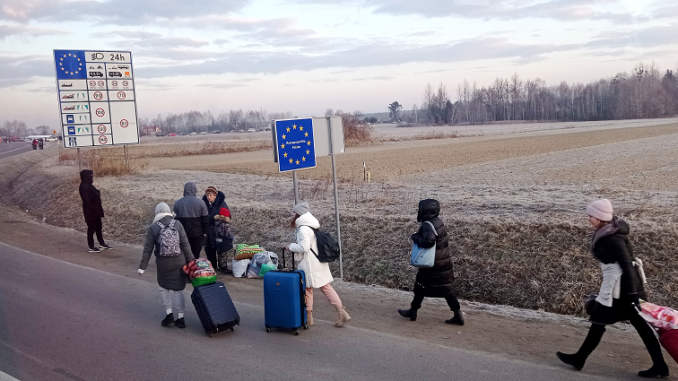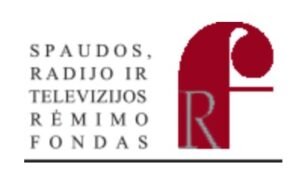
Although Ukrainians who have fled to Lithuania since the start of the war already make up more than 2% of the country’s population, it is predicted that the number of war refugees could soon increase significantly. Not only are the authorities already preparing for this, but also the volunteers who have been actively supporting Ukrainians all these years, Agnė Liubertaitė writing at lrytas.lt news portal.
For its part, the Ministry of Social Security and Labour (SADM) notes that the newly arrived Ukrainians will not be left without housing and assistance and that it is already looking for emergency accommodation for the refugees who arrived this winter.
Container houses could also be rented
Representatives of the Ministry of the Interior (MoI) told lrytas.lt that Lithuania is already preparing for a new wave of refugees from Ukraine. It is predicted that as many as 60-100 thousand people may move to Lithuania during winter.
“Preparations are being made per the plan approved by the European Commission, whereby Lithuania has committed to accepting at least 20,000 more refugees.
Since the beginning of the war, more than 71,000 Ukrainians have been granted residence permits in our country, representing 2.53% of the country’s population,” the MoI said in a comment.
According to the ministry, Lithuania is the 4th largest host of Ukrainian war refugees in the EU after the Czech Republic, Poland and Estonia.
For its part, the SADM said that 71,911 Ukrainian war refugees have arrived in Lithuania since the start of the war, and over 21,000 Ukrainians have already been employed in the country, which is half of the total number of people of working age.
“Ukrainians are working in all municipalities of the country. However, most of them work in the country’s major cities: in Vilnius – 6.8 thousand, i.e. almost every third of Ukrainian, work in the country. In Kaunas – 2.9 thousand, i.e. every seventh Ukrainian who has been employed in Lithuania since the beginning of the war in Ukraine, and in Klaipėda – 2.6 thousand,” the SADM stated.
According to the ministry’s representatives, the flow of war refugees from Ukraine has subsided.
“According to the information gathered in the State Data Management Information System, in recent months, less than 100 Ukrainians have been registered every day, compared to about 150 Ukrainians per day in the summer,” the SADM said in a commentary to the lrytas.lt portal.
However, despite the reduced flows, accommodating refugees may become more challenging if the situation changes.
“Data on the arrival of war refugees from Ukraine is being monitored and shared with other countries to urgently activate places of mass accommodation, such as schools and hospitals that are not functioning, but which are in operation, and which provide only the necessary conditions for accommodation.
Today, there are still places (beds) available in municipalities, which are primarily places adapted for accommodation with furniture, all the necessary equipment and sanitary facilities in the dormitories of vocational schools, as well as in municipal housing, such as community centres,” explained the SADM.
The ministry noted that in view of the destruction of Ukraine’s infrastructure and the approaching winter, and in anticipation of an increase in the number of war refugees from Ukraine, municipalities are continuing to search for non-operational school and hospital buildings that can be used to prepare accommodation for Ukrainians with the help of municipalities quickly.
“It is important to note that other possible accommodation options for Ukrainians, such as renting container houses, are also being considered,” the comment states.
According to the Ministry, compensations are provided to encourage residents, businesses, non-governmental organisations and other legal entities to provide housing or other habitable accommodation to Ukrainians free of charge. The payment is €150 per Ukrainian house.
Although Ukrainians who have fled to Lithuania since the beginning of the war already account for more than 2% of the country’s total population, it is expected that the number of refugees from the war may increase significantly in the near future.
“Compensation is paid to persons who have provided housing or other habitable accommodation from the second month, up to a maximum of 9 months and not exceeding the duration of the housing contract.
Through Strong Together, 32 480 Ukrainian citizens, or 48.7% of the registered and currently staying Ukrainian citizens in Lithuania, were accommodated, and about 10% of Ukrainian citizens were provided with housing in places offered by the state/municipality.
It is estimated that more than 40% of the Ukrainian citizens who have arrived have found (rented) accommodation on their own,” the ministry stated.
Further requests for support continue
It is noted that a large number of Ukrainians who left their country during the 10 months of the war have already managed to settle in their host countries, and Lithuania is no exception. According to Luka Lesauskaitė, Head of Communications of the Lithuanian Red Cross, which provides a particularly large amount of support to refugees, many Ukrainians in Lithuania are now successfully working, and their children are attending educational institutions.
“It is also worth noting that Ukrainians are actively and willingly learning the Lithuanian language – our courses and groups are fully booked, and lessons are held both live and remotely. People are also actively involved in the activities and events we organise. They want to interact and feel part of the community,” said the Red Cross representative.
Nevertheless, the difficulties for war refugees arriving in Lithuania are still present, especially for large families and disabled Ukrainians, she said.
“It is not easy for them to make a living. If the family has a disabled child, the problems and challenges are even greater, especially if the mother has to take care of the sick child all the time and is unable to work,” said Lesauskaitė.
She said that the organisation, together with the German Red Cross, is currently distributing supermarket cards to the most vulnerable families who meet certain criteria, such as those aged 65 and over or their caring family members and those with disabilities or their caring family members.
“The number of people applying for support shows that the need is great and that people are not in a financially easy situation,” said Lesauskaitė.
The Red Cross representative added that the needs of Ukrainians living in different cities in Lithuania today are very individual, so each situation is taken into account individually. However, requests for assistance are dominated by items needed for daily living.
“People ask for household appliances, bedding or other household items. Families also ask for a variety of items for children’s needs, such as prams, toys, clothes and shoes. People still come to pick up hygiene packs or cards to buy hygiene products”, said Lesauskaitė.
However, the Red Cross is also preparing for a possible new wave of Ukrainian war refugees. According to Lesauskaite, the influx could start any day, so it is essential to be ready.
“For now, the refugee flow is not increasing, so we can prepare. We are doing this with municipalities and other institutions, preparing accommodation places, furnishing them, and ensuring that we do not run out of furniture and other necessities.
Right now, we are collecting bed linen in our offices so that we can stock up on all the accommodation in advance. We are also building up our humanitarian reserve with everything from hygiene products to warm blankets.
We have also shared the accommodation sites with other NGOs to see who would be responsible for what,” she explained.
It is noted that the donations donated today are sufficient for the Ukrainians, and the organisation also receives donations from foreign colleagues and various businesses. However, according to Lesauskaitė, donations have dropped significantly since the spring, and she urges people to think again about small but regular donations.
“This is logical and explainable. If we talk about businesses, they have already donated quite a lot, so they have often spent their budget on donations and support. If we talk about people’s donations, they have also decreased because people have already donated to several organisations, so we encourage people to consider regular donations of a few euros.
A small donation, but one that is made every month, gives us regularity in our support, which is very important. So, if you feel that your income does not allow you to donate, please consider donating a few euros each month, which will not be too heavy on your pocket and will be a huge help to us,” said the Red Cross.
Lesauskaitė also mentioned the upcoming winter holidays, saying that volunteers have so far organised several Christmas celebrations for Ukrainian families, with various performances, games and concerts until the New Year.
“We are delighted that families are actively involved, participating and asking for more events of this kind, where everyone can meet, feel the community and be amongst their own. Similar events will take place in every city until the New Year.
If any people would like to contribute to the organisation of the celebrations in any way or would like to donate gifts or give a performance, feel free to contact the Lithuanian Red Cross office in your city,” she urged.


Be the first to comment